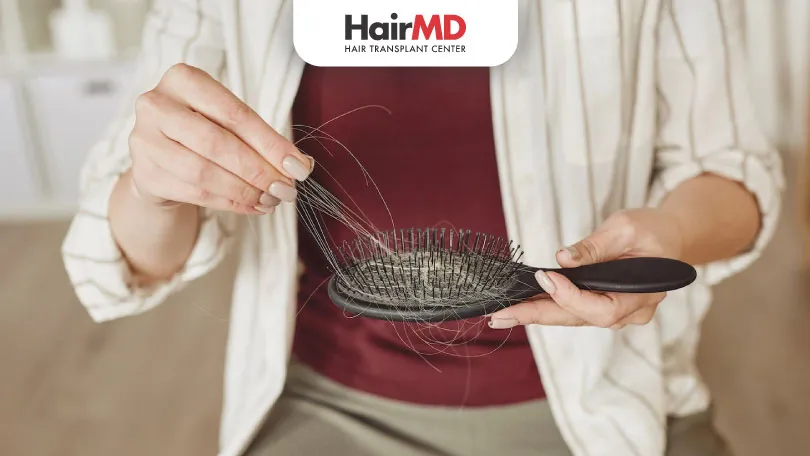24th Sept, 2024

What’s covered in the article?
- How to Make It Grow Faster: Hair Growth
- The Biological Phases of Hair Growth
- Debunking Common Hair Growth Myths
- Practical Tips for Maintaining Healthy Hair
- Conclusion
How to Make It Grow Faster: Hair Growth
The hair growth cycle is a complex yet fascinating process that often leaves many people puzzled. Understanding this cycle is crucial for anyone looking to maintain healthy hair and address concerns like hair loss or thinning. As a health educator, I aim to simplify these concepts and provide practical tips that are easy to incorporate into your hair care routine.
The Biological Phases of Hair Growth
Hair growth occurs in a cyclical pattern, involving three main phases: Anagen, Catagen, and Telogen. Each phase plays a critical role in the overall health and growth of your hair.
Anagen Phase: The Growth Engine
The Anagen phase is the active growth phase of the hair cycle. During this period, hair follicles are in a state of rapid cell division, facilitated by the dermal papilla located at the base of the follicle. This phase can last anywhere from two to six years, depending on genetic factors, and it determines the potential length your hair can achieve. Proper nutrition and care can prolong this phase, allowing your hair to grow longer and thicker.
Catagen Phase: The Transition
The Catagen phase is a short-lived transitional phase that lasts about two to three weeks. It is marked by apoptosis, a programmed cell death process causing the hair follicle to shrink and detach from its nutrient source. This phase signals the end of active growth, preparing the follicles for the next stage. Understanding this phase helps in realizing that hair growth naturally pauses before transitioning to rest.
Telogen Phase: The Rest and Renew
The Telogen phase is a resting period that lasts around three to four months. During this time, hair follicles are inactive, and the old hair is eventually pushed out by a new hair shaft. Approximately 10% to 15% of your hair is in this phase. Recognizing this phase is vital for understanding natural hair shedding and renewal cycles.
Debunking Common Hair Growth Myths
- Myth 1: Frequent Trimming Accelerates Hair Growth
Trimming can help eliminate split ends, but it does not influence the rate at which your hair grows.
- Myth 2: Hair Growth Products Offer Instant Results
While certain products can support hair health, patience and consistency are essential as hair growth cycles take time.
- Myth 3: Stress Causes Immediate Hair Loss
Stress can impact hair cycles, but its effects are typically observed after a few months as it can prematurely push hair into the Telogen phase.
Practical Tips for Maintaining Healthy Hair
Nutrition and Diet
A diet rich in proteins, iron, and vitamins such as B and D supports the Anagen phase. Consuming foods like leafy greens, nuts, and fish can enhance hair strength and vitality.
Lifestyle Modifications
- Stress Management: Engage in relaxation techniques like meditation and exercise to mitigate stress-related hair issues.
- Hydration and Environmental Care: Ensure adequate hydration and shield your hair from harsh environmental factors like pollution and UV rays.
Gentle Hair Care Practices
- Use Mild Products: Opt for sulfate-free shampoos and conditioners to maintain scalp health.
- Regular Scalp Care: Gentle scalp massages with natural oils can boost circulation and nourish hair follicles.
Consultation and Treatment
If experiencing significant hair loss, consulting a dermatologist in pune can provide targeted treatments and interventions tailored to your hair’s needs.
Do You Know?
Nearly 250 Patients Visit HairMD
Everyday For Various Hair Concerns?
(Your journey to healthier and fuller hair starts here!)
Meet Our Dermatologists
Conclusion
Understanding the complex processes of the hair growth cycle empowers you to take proactive steps in hair care. By embracing a holistic approach that includes diet, lifestyle adjustments, and proper haircare routines, you can maintain luscious and healthy hair. For personalized advice and treatments, seeking hair treatment professional guidance is always beneficial.
Stay informed, stay confident, and let your hair shine with health!
Further Reading
Top Kitchen Ingredients to Boost Hair Growth
Discover the best kitchen ingredients for hair growth! Use coconut oil, onion juice, aloe vera & more to nourish your hair naturally and reduce hair fall.
How to Treat Alopecia Areata at Home: Natural Solutions for Hair Growth
Explore home remedies for alopecia areata to promote hair regrowth and boost confidence from home.
Redensyl vs. Minoxidil: Which is the Better For Hair Growth?
Discover the differences between Redensyl and Minoxidil for hair growth. Learn about their effectiveness, side effects, and which treatment might be better for you.
Biotin-Rich Foods for Natural Hair Growth
Know the best foods rich in biotin to help your hair to grow naturally stronger and healthier by experts from HairMD, Pune
Have thoughts? Please let us know
We are committed not only to treating you, but also educating you.











